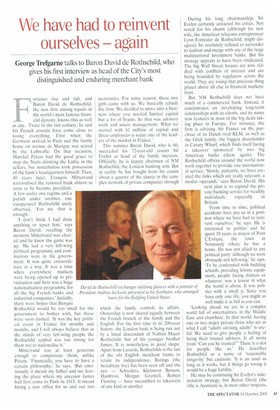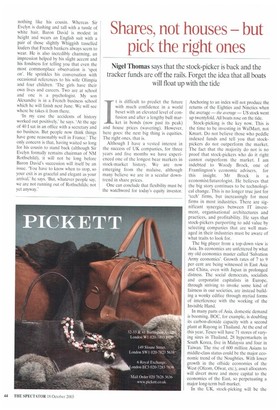We have had to reinvent ourselves again
George Trefgarne talks to Baron David de Rothschild, who gives his first interview as head of the City's most distinguished and enduring merchant bank
F _ ortunes rise and fall, and the new first among equals in Baron David de Rothschild, the world's most famous finan cial dynasty, knows this as well as any. Twice in the last century, he and his French cousins have come close to losing everything. First when the Germans arrived in Paris and the family home on avenue de Marigny was seized by the Luftwaffe. On that occasion, Marshal Petain had the good grace to stop the Nazis drinking the Lafite in the cellars, but nonetheless took possession of the bank's headquarters himself. Then, 40 years later. Francois Mitterrand nationalised the restored bank almost as soon as he became president. A Jew under one regime and a pariah under another, one exasperated Rothschild uncle observed. 'For me that is enough.'
'I don't think I had done anything to upset him,' says Baron David, recalling the moment Mitterrand was elected and he knew the game was up. 'He had a very left-wing political programme and communists were in the government. It was quite extraordinary in a way. It was a time when everywhere markets were being opened up to privatisation and here was a huge nationalisation programme for all the big French banks and industrial companies.' Initially, there were hopes that Banque Rothschild would be too small for the government to bother with, but these were soon dashed. 'It was the key political event in France for months and months, and I will always believe that in the minds of very left-wing people the Rothschild symbol was too strong for them not to nationalise it.'
Mitterrand was at least generous enough to compensate them, unlike Petain. 'Financially, you have to have a certain philosophy,' he says. 'But emotionally it meant my father and me leaving the place where my ancestor James had first come to Paris in 1815. It meant hiring a new office for us and our two secretaries. For some reason, these two girls came with us. We basically rebuilt the firm. We decided to move into a business where you needed limited capital but a lot of brains. So that was advisory work and assets management. What we started with $1 million of capital and three employees is today one of the leaders of the market in France.'
This summer Baron David, who is 60, succeeded his 72-year-old cousin Sir Evelyn as head of the family interests. Officially, he is deputy chairman of NM Rothschild, the London banking arm. But in reality he has bought from his cousin about a quarter of the shares in the complex network of private companies through which the family controls its affairs. Ownership is now shared equally between the French branch of the family and the English. For the first time in its 200-year history. the London bank is being run not by a lineal descendant of Nathan Mayer Rothschild, but of his younger brother James, It is nonetheless in good shape. Apart from Lazards, Rothschilds is the last of the old English merchant banks to retain its independence. Barings (the hereditary foe) has been seen off and the rest — Schroders, Kleinwort Benson, Hambros, Morgan Grenfell, Robert Fleming — have succumbed to takeovers of one kind or another. During his long chairmanship, Sir Evelyn certainly attracted his critics. Not noted for his charm (although his new wife, the American telecoms entrepreneur Lynn Forrester de Rothschild. might disagree), he resolutely refused to surrender to fashion and merge with any of the large multinational investment banks. But his strategy appears to have been vindicated. The big Wall Street houses are now riddled with conflicts of interest and are being hounded by regulators across the world. They are losing that precious thing prized above all else in financial markets: trust.
But NM Rothschild does not have much of a commercial bank. Instead, it concentrates on developing long-term relationships with its clients, and its name now features in most of the big deals taking place in Europe. For instance, the firm is advising Air France on the purchase of its Dutch rival KLM, as well as the Glick family, the biggest shareholder in Canary Wharf, which finds itself facing a takeover sponsored by two big American banks (them again). The Rothschild offices around the world now work together to provide one international service. 'Slowly, patiently, we have created the links which arc really relevant, a modus operandi,' says Baron David. His next plan is to expand the private banking service for wealthy individuals, especially in Britain.
'From time to time, political accidents have put us in a position where we have had to reinvent ourselves,' he says. He is interested in politics and he spent 18 years as mayor of Pont L'Eveque, the town in Normandy where he has a home. He was not allied to any political party 'although we were obviously not left-wing,' he says. 'To be confronted with building schools, providing leisure equipment, people facing distress or whatever, was a lesson in what ortrair of the world is about. It was poli arranged tics with a small p. Since you have only one life, you might as well make it as full as you can. 'Looking ahead, we are in a complex world full of uncertainties, in the Middle East and elsewhere. In that world, having one or two major private firms who act as what I call "adults advising adults" is useful. We need to give people a feeling of being their trusted advisers. It all stems from "Can you be trusted?" There is a slot for people like us.' He describes Rothschild as a name of 'reasonable longevity' but cautions: 'It is an asset as long as it works, but if things go wrong it would be a huge liability.'
He may be continuing Sir Evelyn's independent strategy, but Baron David (the title is Austrian) is, in most other respects, nothing like his cousin. Whereas Sir Evelyn is dashing and tall with a tussle of white hair. Baron David is modest in height and wears an English suit with a pair of those slightly Whiggish tasselled loafers that French bankers always seem to wear. He is also incredibly charming, an impression helped by his slight accent and his fondness for telling you that even the most commonplace observation is 'spot on'. He sprinkles his conversation with occasional references to his wife Olimpia and four children. 'The girls have their own lives and careers. Two are at school and one is a psychologist. My son Alexandre is in a French business school which he will finish next June. We will see where he takes it from there.
'In my case the accidents of history worked out positively,' he says. 'At the age of 40 I sat in an office with a secretary and no business. But people now think things have gone reasonably well in France.' The only concern is that, having waited so long for his cousin to stand back (although Sir Evelyn formally remains chairman of NM Rothschild), it will not be long before Baron David's succession will itself be an issue. 'You have to know when to stop, so your exit is as graceful and elegant as your arrival.' he says. 'But, whatever people say, we are not running out of Rothschilds; not yet anyway.'



































































































 Previous page
Previous page